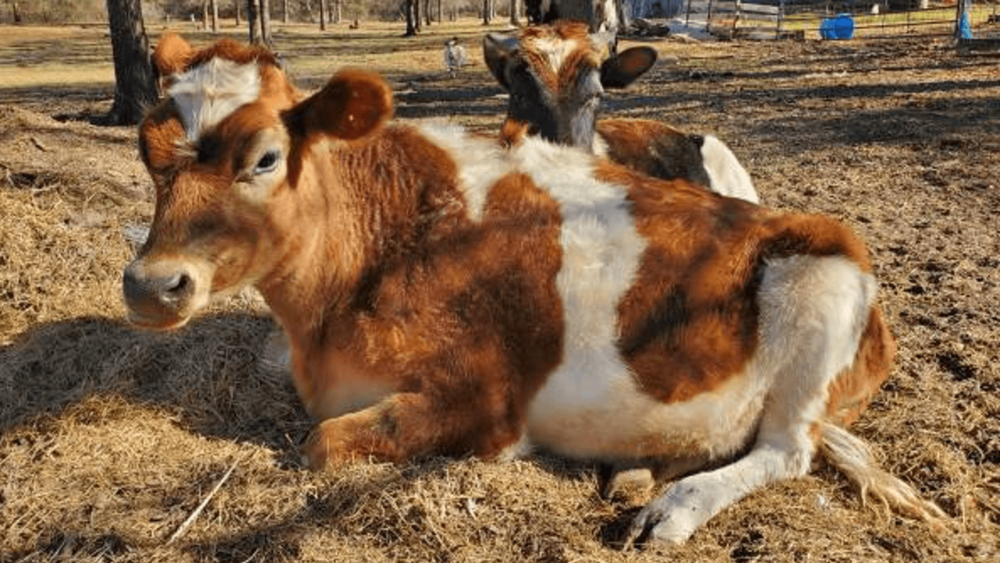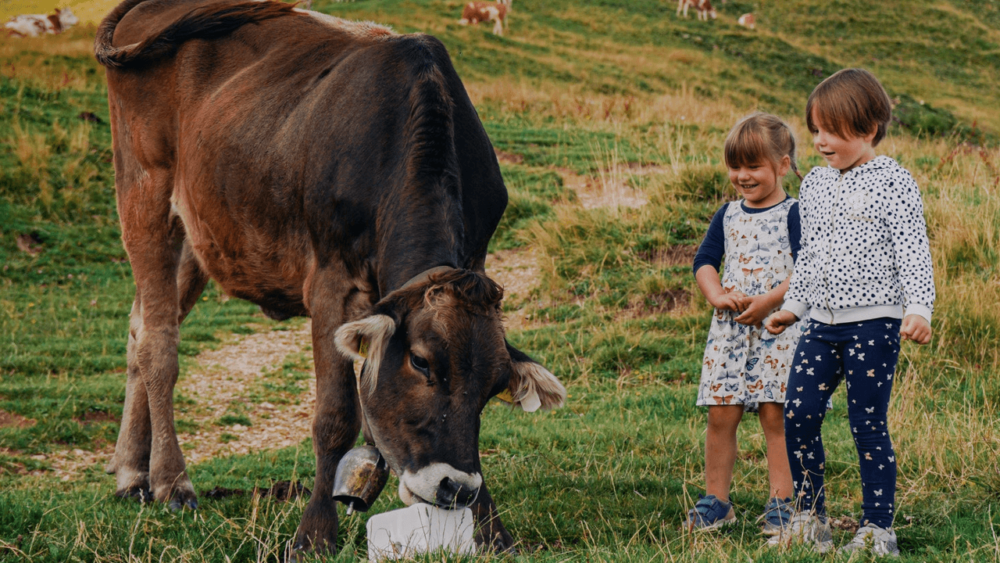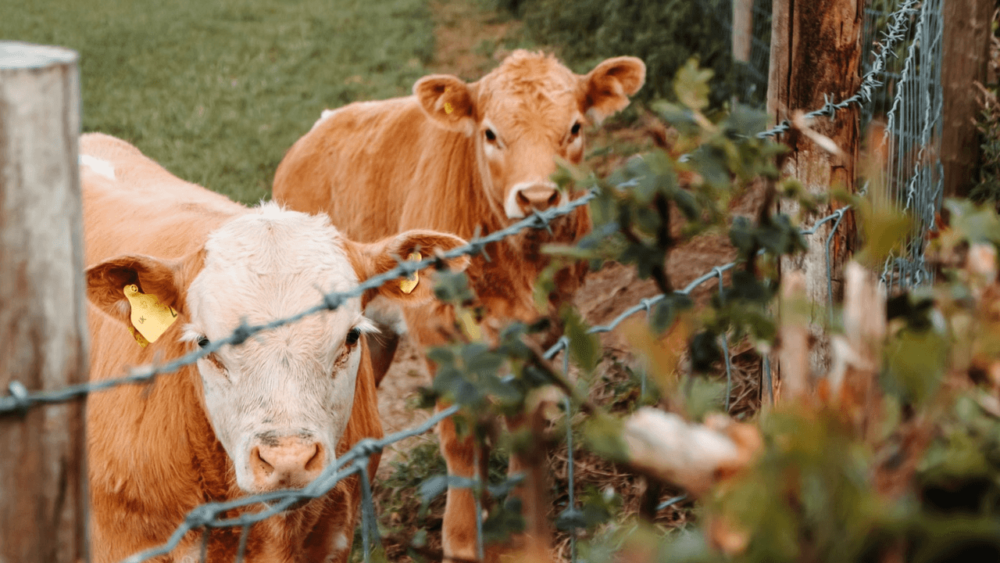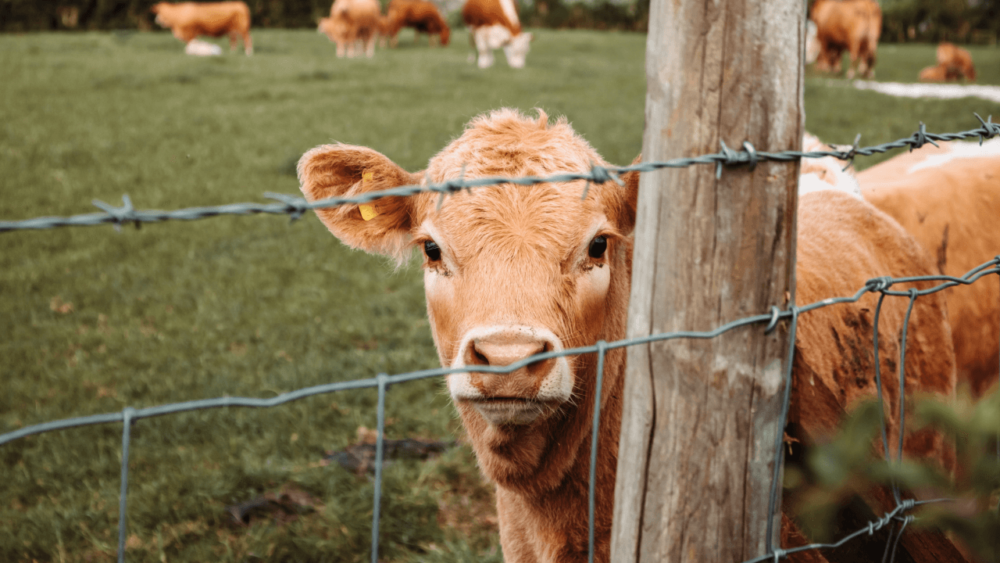You’ve probably noticed grocery prices rising. Coupled with a desire to go back to the land and become more self-sufficient, many families are looking to source their own food. Whether you are looking for a meat or dairy cow (or both), there are a lot of benefits to purchasing from a homestead or a small, local farmer.
Cows purchased from homesteads usually cost a few hundred dollars less than cows purchased for dairy or beef farms. That’s because homesteaders usually want unique characteristics, a family-friendly cow instead of “perfect” genetics.
Plus, many homesteaders raise cows for fun or to supply the family with either beef or dairy. A dairy farmer may sell a cow for dropping production from 5 gallons a day down to 4.5 gallons a day. But, 4.5 gallons is still more than more families need.
In fact, most of the homesteaders I have spoken with are perfectly happy with a 3-4 gallon cow, and many are happy with even fewer gallons.
Plus, homesteaders have different goals than mega-farms. Homesteaders aren’t usually raising cattle on a larger scale. A homestead herd can be as small as 2-3 cows, or as large as 10-15 cows.
Homesteaders Help Preserve Unique Cow Qualities
Because the herds are smaller, homesteaders aren’t usually as worried about all the intricate profitability details. If a homestead calf takes an extra month or two to fatten, it’s usually not a big deal.
Homesteaders often look for cows that are “cute,” tame, and that have the temperament to be a good pet. They often want unique breeds, looks, or fun mixes. In the cow world, that’s called a “yard decal.” Mini cows have become popular due to homestead popularity.
And, I think that’s wonderful because a lot of cow breeds that aren’t as common are making a comeback because of homesteaders!
Once the herd gets to 100 cows or larger, the homesteader has usually converted to a farmer and is breeding cattle for profit. At that point, their goals change, and the qualities they look for change as well.
- Homesteaders usually want a friendly, pet cow instead of a registered cow
- They usually want something more manageable on a smaller scale
- The table needs of the family usually outweigh market condition requirements
10 Reasons You May Want to Buy a Cow From A Homesteader
If you are looking to purchase a cow for your family or homestead, it can be a great idea to purchase from another homestead. Here are 5 reasons buying a cow from a homesteader is a good idea:
- Homesteaders are passionate about their animals
- They usually know each animal, its quirks, tastes, and habits
- Homesteaders often breed and raise unique cow breeds
- Their cows are usually beautiful and lovely
- Homesteaders are often willing to answer questions and help newbies out
- Homesteaders often prefer to raise tame, friendly cows that are family-friendly
- Homesteaders rock in the dual-purpose cow space
- As a collective, homesteaders offer more variety of cows than the larger operations, which focus on specific breeds and genetics
- Homesteaders usually care about where their animals are going
- Homesteaders were once new at it also- and have a lot of patience
Homesteader Cows Are Usually Family Friendly
Cows can come wild or tame. They can be standoffish or friendly. As a whole, cows raised by farmers can be part of a small farm (100-400 head) or a larger operation (50k head). But, even a smaller cattle farm of a hundred head will usually have more standoffish cows.
When you have that many cattle, it just isn’t feasible to talk to and interact with each cow on a regular basis. The most frequent interaction between cows and farmers usually occurs at feeding times. As a result, the cows see the farmer as someone who helps to meet their needs but otherwise ignores him or her.
But, a homesteader is different. Usually, their cows are part of their family. The homesteader often knows each cow’s temperament, preferences, and nuances. The cows are friendly and often treated not just as part of the homestead, but also as a pet.
Bottle-fed babies are often homestead cows and can be very friendly to people. This can be good or bad with bulls, depending on who you talk to. Some people love having friendly bulls, while others find that people-friendly bulls can turn into a nightmare when their hormones hit full-scale.
If you are looking for a friendly cow, especially for a homestead, buying another homesteader’s cow can be a great way to go!
Should I Buy a Calf, Yearling, or Full-Grown Cow?
As a general rule, whether you buy a calf, yearling, or fully grown cow will depend on a couple of things:
- Are you experienced in handling cows?
- Are you a homesteader or looking for a family cow, or a professional operation?
- What is your purpose in purchasing a cow?
- What is your long-term plan with bovines?
Your Experience Level Matters When Buying a Cow
It’s important to gauge your experience level when purchasing a cow. There are two main reasons experience matters. First, it helps you make a better purchase. Second, without experience, you need to find a good support system when you purchase your cows.
Experience Matters When Choosing the Age of a Cow To Buy
That’s because cows can be expensive, but the “cheaper” way isn’t always cheaper. Many people assume that they will save a lot of money by purchasing a calf instead of a grown cow or bull.
In the upfront cost, that may be true. A calf can cost as little as $200 to the cost of a yearling at $800. A proven adult will usually cost at least $1,000 and can cost quite a bit more, as much as $3-4,000.
But, if you consider the additional cost of the supplemental milk, in the case of a bottle baby, and feed, a yearling is usually cheaper overall. And, it’s also important to gauge if you have the experience to really analyze a heifer or unproven bull.
That’s because a heifer that can’t get pregnant can end up costing you a lot more than a proven cow. A heifer that’s unable to conceive can cost a couple of thousand dollars after vet bills, tests, and stud rentals. That’s a lot more money than butchering a regular beef cow (which is where she’s headed).
As a general rule, consider purchasing proven cows and bulls if you don’t have any experience in raising cattle. This can save you thousands of dollars in vet bills, tears, frustration, and stress.
If you have experience raising cows, then purchasing calves, even young ones, can be a great way to grow your herd cheaply.
Homestead Cows Are Perfect For Newbies
Homesteaders are great to purchase cows from. That’s because they are usually passionate about their cows and they want to be helpful. I’ve found that most homesteaders are happy and eager to help teach and guide you in caring for your new cow or calf.
I’ve witnessed homesteaders come out to answer questions, give assistance, or teach new cow owners what to do. I’ve watched as homesteaders invoice potential buyers to their homestead to teach and show them the routine before they make a decision.
Homesteaders love to help newbies with their new cows. They want their cows raised in good living conditions. They want to help others to succeed. It’s not always the case, but it often is.
And, I’ve found the same with many smaller farmers.
Large farm operations often separate the selling of the cows from those who actually care for them. And, even when they don’t, they just don’t have the time to walk you through caring for your cows.
Family Cow Versus Farm Cow
I live in rural farmland, so the lines between a small farmer and a homesteader get a little more blurry here than they do just outside the suburbs. Around where I live, smaller farmers own and care for their own herds of 50, 60, and even 150 cattle. And they cry when they stay up all night to save a calf, only to have it die the next morning.
For this article, I’m going to define homesteading as when (1) you purchase a cow or cows for primarily your own family’s needs or when (2) the farmer primarily cares for his own herd (typically the small farmer). I’ll call farming when you purchase cows primarily to sell the beef or dairy as an income, especially bigger farmers.
It’s important to define the purpose of your cow. Do you want cows to raise for profit or to meet your family’s food needs?
Purchasing Cows For-Profit Farming
Because the cow you buy will be very different depending on your answer. If you are looking to purchase cows for a larger herd and your primary concern is profit, then your requirements will be very much dictated by what the dairy and meat markets require.
There’s a reason that most commercial beef operations are Angus and dairy cows are Holstein. They produce the greatest overall profit. Angus cattle fatten quickly and Holstein cows produce a ton of milk, even though it’s got less cream.
Commercial cattle are usually bred to tighter specifications, culled more frequently when a bull or cow doesn’t measure up, and bought and sold at auction or in larger batches.
Purchasing Cows for Homesteading
While commercial cows are bred and raised for quicker and more sustainable profits, the family cow doesn’t usually need the same requirements.
Your family probably doesn’t care if a dairy cow produces 5 gallons versus 4.75 gallons, but a dairy would care. You may not want to spend the extra a maximize milk production out of a cow currently producing 3 gallons of milk a day.
Homestead dairy farmers often opt for breeds that are calmer and friendlier. They often choose breeds or crossbreeds that produce a little less milk, but more cream. Or, they choose dairy cows that are also beautiful and unique looking.
And, if you are raising cows for your family’s beef consumption, you probably don’t want the largest or fastest cow breed out there. Miniature beef cows have become quite popular with homesteaders. Angus is still pretty popular with homesteaders, but so are Dexter (dual purpose), Aberdeen, or miniature cow.
Each breed has different flavors and strengths. Homesteaders have a greater ability to choose the one they like.
As a homesteader, you can choose cows that are unique, rare, endangered, or dual purpose. I personally feel that homesteaders provide a lot of value in keeping breeds strong and in demand. Otherwise, we might have a lot fewer cattle breeds.
You’ll also want to determine if you want to purchase your own bull, rent one for breeding, or use AI (Artificial Insemination.)
Dairy, Beef, Dual Purpose or Other?
If you aren’t sure which type of cow you want to purchase, you are probably purchasing it for a homestead. That doesn’t mean that homesteaders don’t know what kind of cows they want, it just means that most newbies are going to be homesteaders. It takes a lot of capital and a lot of knowledge to run a cow operation.
Generally speaking, a dairy cow will give 3-4 gallons of milk a day. A beef cow will fatten and be ready for the market in 1-2 years, depending on his feed. And, a dual-purpose cow will give less milk and be smaller, but fulfill the needs of most families for both dairy and beef.
In addition, some families love to show their cows. Jackpots and professional shows highlight rare and unique breeds, as well as common and well-loved breeds. Show cows have very specific criteria that aren’t always the same as beef or dairy herds.
If you aren’t sure what kind of a cow you want, talk to the homesteaders in your area. Visit their homestead. Make sure that you are up to the commitment of a cow. Each type of cow has it’s own set of needs. Feed is important and so is commitment.
Conclusion
Buying the right cow is a big decision. Make sure you are prepared for the long haul. It’s better to take a year to do your research and make sure you are prepared for your cows than to rush into the decision and face disaster, death, or disease in your herd.
Recommended Cattle Supplies (And Dairy Supplies)
This list contains affiliate products. Affiliate products do not cost more but helps to support BestFarmAnimals and our goal to provide farm animal owners with accurate and helpful information.
This shelter is pretty easy to put together and it shelters a good number of cows. It’s sturdy and can withstand our high winds and heavy snows. And it’s cheaper than a barn and easier to build.
Colostrum is critical for calves. If you aren’t able to get some from your cows, this is a quality supplemental colostrum.
Probiotic for cattle with digestion issues in a oral tube. It works for other ruminants and is safe for goats, but is formulated especially for cattle.
A halter to lead Bessie around. This show halter also works for kids showing for 4H.
All Stock Feed is on Amazon, but you’ll pay less if you find it at your local feed store. It’s a great feed for cattle.
Electrical rope for your fencing. This keeps cattle in, but goats, alas- not so well.
Dairy Cow Recommended Supplies
Disposable towels or wet wipes are the first step in cleaning the udders.
Teat Dip and a dip cup are essential for keeping your milk clean. It lasts a while. Mine usually lasts a year to a year and a half.
I use a stainless steel bucket when I milk because it’s easy to clean and carry. These are my preferred milk filters and I use them for cow and goat milk.
This large jar funnel stays much more stable than regular funnels and can handle larger milk volumes.
I like this grain feeder while milking and use this size for the cows and goats being milked.
Balm ointment for sore udders. This cream is popular for people but formulated and created for cows’ udders.
Mastitis Test detects mastitis.




